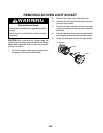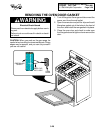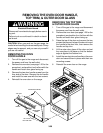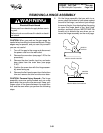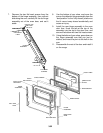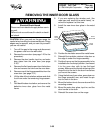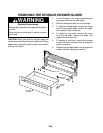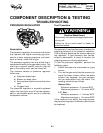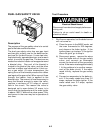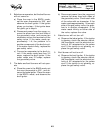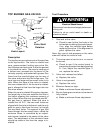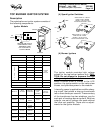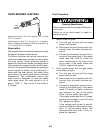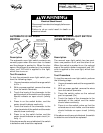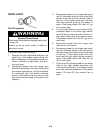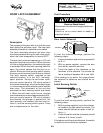
4-2
DUAL GAS SAFETY VALVE
1. Broil burner operates, but the bake burner
will not come on.
a) Place the oven in the BAKE mode, set
the oven thermostat to 350 degrees,
and observe the bake igniter. If the
igniter glows, go to step c. If the igniter
does not glow, go to step b.
b) Disconnect power, remove the wires
from the bake side of the gas safety
valve, and connect an ohmmeter
across the terminals of the gas safety
valve. If the meter reads approximately
1 Ω, the problem is in another compo-
nent of the bake circuit. If the meter
reads infinity, replace the gas safety
valve.
c) Connect an ampmeter to the bake cir-
cuit. If the meter reads less than 3.2
amps, replace the bake igniter. If the
meter reads over 3.2 amps, replace
the gas safety valve.
WARNING
Test Procedure
Description
The purpose of the gas safety valve is to control
gas to the bake and broil burners.
The dual gas safety valve has one gas input
and two gas outlets, one for the bake burner,
and one for the broil burner. It uses two iden-
tical electrically-operated devices, one for each
outlet, to control the gas flow. The devices are
made of an electric heater coil wrapped around
a bimetal strip. One end of the bimetal is
riveted to the plate of the valve, and the other
end has a rubber seal attached to it that cov-
ers a gas outlet. At room temperature, the
spring force of the bimetal presses the rubber
seal against the gas outlet. When current flows
through the heater, heat is applied to the
bimetal strip. The amount of heat necessary to
warp the bimetal enough to open the valve,
requires a minimum of 3.2 amps of current
flow in the circuit. The reason the valve is
designed not to open below 3.2 amps, is to
insure that the temperature of the oven igniter
is above 1800˚ F before the valve opens. Only
one burner in the oven may be in operation at
one time.
Electrical Shock Hazard
Disconnect from electrical supply before ser-
vicing unit.
Failure to do so could result in death or
electrical shock.



